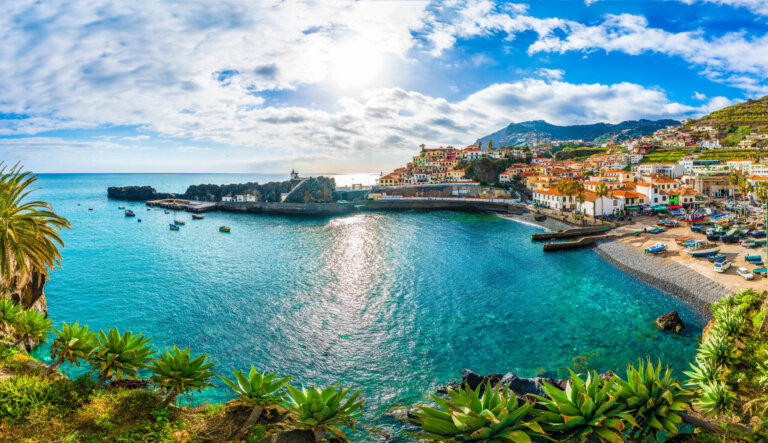Portugal D7 Residency Visa
Table of Contents
ToggleIf you’re looking for residency in an EU country that could ultimately lead to citizenship, the Portugal D7 residency visa is most likely your best bet. Unlike the expensive “Golden Visa” option, which most country’s offer, the D7 passive income or retirement visa only requires a relatively small residual income.
Having spent five years looking at various countries weighing up the pros and cons our first option was the Italian “Elective Residence Visa”. We had tickets booked to fly there in 2020 but when the Covid struck. With Covid cabin fever setting in and with Italy still closed, Montenegro opened its borders in early 2021 and we headed there instead. Initially it tick many boxes and the process to obtain residency was quite straightforward, so we made the move and settled there.
After having lived here for two years, we decided that it was not a country we could call home and we put plans in place to move to Portugal. In the previous years while doing the research, we looked at countries like Australia, New Zealand, Panama, Malta and Italy. Portugal for some reason had never crossed our radar. We’ve just come back from a scouting trip and absolutely fell in love with the country and its people and are now in the process of compiling the necessary documentation to apply for a D7 visa application which will enable us to make the move to Portugal and apply for residency.
D7 Residency Visa - What is required?
Also known as the passive income or retirement visa, the D7 application initially gives you 4 months in which to get yourself to Portugal and apply for a two-year temporary residency (done at the SEF). This is followed by an additional three years after which you can apply for permanent residency or citizenship.
The time you are required to spend in the country is sixteen months during the first two-year temporary residency period and thereafter twenty eight months during the subsequent three year temporary residency period.
Passive income requirements are:
- 1st applicant: 100% of the current basic salary (€ 870 x 14 months) = € 12 180/year;
- 2nd applicant 50% of the current basic salary (€ 435) = € 6090/year;
- Children/dependents (parents) are at 30% or (€ 261) = € 3 654/year.
The procedure consists of two stages. The first is to obtain your D7 residency visa from your nearest Portuguese Consulate or Embassy. This is estimated to take 60 days. The second stage will be in person with the Foreigners and Borders Services (SEF) in Portugal and is estimated to take about 4 weeks from your date of appointment. Once you arrive you will schedule an appointment which is sometimes hard to get. Most travel to other regions based on availability.
Please note that your D7 visa does NOT grant you access to other Schengen zones as some sites might lead you to believe, but once you have residency it DOES.
Stage 1 – D7 Visa Application
- D7 Visa Application.
- Cover letter (always a good idea to explain your intentions. Do it in English and Portuguese).
- Copy of passport and 2 passport photos.
- Travel insurance for 12 months.
- Bank statements showing passive income for 6 months.
- Your NIF (Portuguese tax number) number.
- Proof of Portuguese bank account.
- Proof of flights.
- Proof of accommodation (12-month lease or deed of property ownership).
- An apostilled police clearance from your country of residence.
- If applying as a married couple you will need and apostilled marriage certificate and apostilled birth certificates.
Stage 2 – Residency Application
- Valid D7 Visa.
- Two passport photo’s.
- Passport.
- Evidence of passive income.
- Evidence of accommodation.
- Criminal clearance certificate.
- NIF.
- Social Security registration.
DISCLAIMER: The information in this article was correct at the time of publishing. Please always verify the information contained herein with the Portuguese Embassy or VFS services.
Considering to use a third party to assist you throughout the entire process?
Fast track your Portuguese D7 Visa Application by completing the form and a representative will get in touch with you to assist you!
D7 Visa Costs :
For your D7 Visa application you can expect to pay around €90, and the residence permit around €160. There are many legal services that will offer their assistance at a hefty fee.
It’s really not as daunting as it seems. Stage 1 is the most stringent process, the embassy or VFS will guide you through this. Stage 2 is more of a formality to complete biometrics and reaffirming what you have already provided in stage 1.
If you choose to use a 3rd party to handle all the messy work, TGA has partnered up with Prismaat.
They will handle everything, the application, getting your NIF, SNS and NISS numbers to even exchanging your drivers license for a local one. You can contact Prismaat who will fast track your D7 visa. Their payment is split into three. 40% upfront, 20% half way through and the balance upon receipt of your residency.
For your bank account, you will have to open this in person. Alternatively can appoint an attorney with a POA to do this on your behalf.
Requirements for the bank account are:
- NIF number
- Copy of passport.
- Proof of your resident countries tax number
- 3 months bank statement showing passive income.
We used Patricia at Novobanca (Estoril) for the bank account, she speaks English and was very helpful.
Choosing your area:
The South of Portugal (Algarve and Lisbon) is the most desirable part with the best weather. It’s also the most expensive! Weather wise, on average you will find that the difference in temperature between the North and the South is around 3 degrees with rainfall in the north around 125cm -150cm and only 50cm in the South. Expats tend to gravitate towards the Algarve but depending on your requirements and budget the North offers better value for money and the cost of living is up to 20% cheaper.
Hiring a car was relatively inexpensive. We did an eight-day road trip exploring Portugal to see if we liked the place and what area we preferred. We deliberately went in winter to see Portugal at its worst. It rained all the way on our trip from Braga back to Lisbon, so on certain days there is no escaping the rain. The majority of Europe is cold and wet in winter.
Our road trip in a nutshell:
We landed in Lisbon, collected the rental car and headed for Sintra to spend the night to avoid the city traffic the next morning. We then headed south to Cascais to open our bank accounts before heading up to Coimbra via Nazare and Figuera da Foz. From Coimbra we headed further north to spend two nights in Aveiro, two nights in Porto and a night in Braga before heading back towards Lisbon where we spend another two nights exploring the capitol. Each town along the way was more beautiful than the one before, but Braga was a unanimous YES from both of us. This is why it is important to see if for yourself. It’s not a decision you can base on the opinion of others or by following the herd. It’s a feeling you get when you see the right thing. We plan to rent initially which will give us more time to get to know an area before rushing into a property purchase.
Obrigado Portugal!
Portugal surpassed both of our expectations. The people were very friendly and always willing to help and the majority spoke English. The country is super clean, roads and highways are amazing, prices are reasonable compared to the rest of Europe and we always felt safe.
For us, the D7 residency visa option is hopefully our means to live in this beautiful country and call it home.
Planning a trip to Portugal? See our “Travel Resources” page to help plan your trip.


























